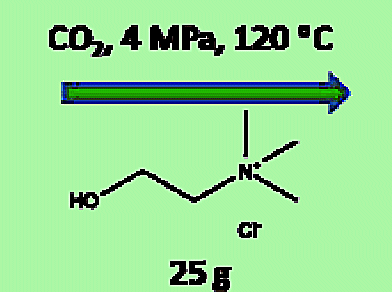5-hydroxymethylfurfural (HMF) is a platform chemical especially used for the fabrication of renewably sourced and potentially safer polymers. Much effort has been devoted to the acid-catalyzed dehydration of hexoses to HMF. The efficiency of this reaction is mainly governed by the nature of the solvent used. In particular, the solvent has to be capable of dissolving a large amount of carbohydrates while diluting released water in order to limit the side-reaction of rehydration of HMF to levulinic and formic acids.
Karine De Oliveira Vigier and colleagues, University of Poitiers, France, show that up to 70 % yield of HMF can be obtained in a ChCl/CO2 system. The purity of the recovered HMF is >98 %, and the reaction medium can be recycled.
HMF is highly stable in the presence of ChCl, presumably through the formation of a eutectic mixture. This allows performing the catalytic process with a high content of fructose as compared to traditional procedures, in which HMF is obtained in yields higher than 60 % only from a fructose content lower than 20 wt %.
Whereas after extraction HMF is unavoidably partly contaminated with traditional Lewis and Brønsted acids, the possible decrease of pH upon addition of CO2 allows circumventing this problem. Carbonic acid is readily converted to CO2 and water when the CO2 pressure is released.
The system is also capable of promoting the tandem hydrolysis/dehydration of inulin to HMF.
- Dehydration of Highly Concentrated Solutions of Fructose to 5-Hydroxymethylfurfural in a Cheap and Sustainable Choline Chloride/Carbon Dioxide System,
Fei Liu, Joël Barrault, Karine De Oliveira Vigier, François Jérôme,
ChemSusChem 2012.
DOI: 10.1002/cssc.201200186




